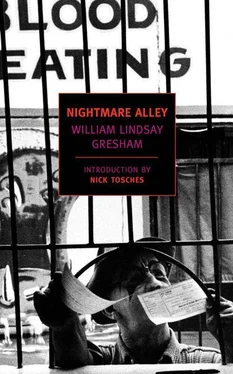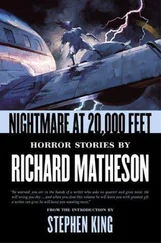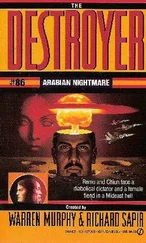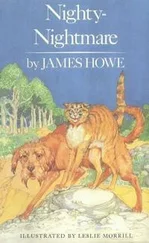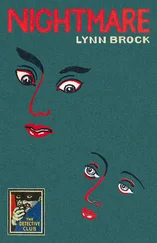Stan shook his head and rubbed his face evenly with the towel. He hung up his suit of tails and stepped into his tweed trousers. He ran a comb through his hair and knotted his tie.
Outside the snow was falling lightly, lingering on the dark surface of the dirty window of the dressing room.
At the stage door the winter met them with an icy breath. They found a cab and got in and Molly slipped her arm through his and rested her cheek against his shoulder and stayed that way.
“Here y’are, buddy. Hotel Plymouth.”
Stan handed the driver a dollar and helped Molly out.
They passed through the revolving door into the drowsy heat of the lobby and Stan stopped by the cigar counter for cigarettes. He lifted his eyes to the desk and then he stopped and Molly, turning back to see if he was coming, hurried up. She put her hand on his arm. “Stan, darling-what’s the matter with you? God, you look terrible. Are you sick, honey? Answer me. Are you sick? You’re not mad at me, are you, Stan?”
Abruptly he turned away and strode out of the lobby into the wind and the winter night. The cold air felt good and his face and neck needed the cold. He turned to the girl. “Molly, don’t ask any questions. I just saw somebody I’m trying to duck. Go upstairs and pack our stuff. We’re checking out. Got any dough? Well, square up the bill and have the bellhop bring the stuff out.”
Without asking any more questions she nodded and went in.
When she came down the woman at the desk, the night clerk, smiled up at her from a detective story. “Will you make up my bill, please? Mr. and Mrs. Stanton Carlisle.”
The woman smiled again. She was white-haired and Molly wondered why so many white-haired women insist on bright lipstick. It makes them look like such crows, she thought. If I ever get white-haired I’ll never wear anything darker than Passion Flower. Yet this woman had been quite a chick in her day, Molly decided. And she had lived. There was something about her that made you think she had been in show business. But then lots of good-looking people had when they were young and that really didn’t mean a thing. It was managing to stay in show business and stay at the top that counted. Never getting to be a has-been and washed-up. That was the worst thing, to be washed-up. Only you had to save a pile of money while you were in the chips. And what with staying at the best places and buying dinners and drinks for managers and newspapermen and people they never seemed to get much ahead at the end of a season on the road. That is, the more the act was worth, the more it seemed to take to sell it.
“That will be eighteen dollars and eighty-five cents,” the woman said. She looked searchingly at Molly. “Is-is your husband coming back to the hotel?”
Molly thought fast. “No. As a matter of fact, he’s already waiting for me further downtown. We have to make a train.”
The woman’s face was not smiling any more. It had a hunted, hopeful look which was, at the same time, strangely hungry. Molly didn’t like it a blessed bit. She paid and went out.
Stan was pacing up and down savagely. A cab was standing by the curb with its meter ticking. They put the bags in and rode off.
All hotels are the same place, Molly thought later, lying beside Stan in the partial darkness. Why do they always have street lights outside the windows and car lines in the street and elevators in the wall right beside your head and people upstairs who bang things? But anyhow it was better than never getting around or seeing anything.
Watching Stan undress had stirred her and made her remember so many good times and she had hoped he would feel like it even if they were both as tired as dogs. He had been so cross lately and they always seemed to be tired when they went to bed. With a little flare of panic she wondered if she were losing her looks or something. Stan could be so wonderful. It made her go all wriggly and scarey inside to think about it. God, it was worth waiting for-when he really wanted a party. But then she remembered something else and she began saying to herself, “Eighty-eight-organization. Shall I join some club, union, fraternity, or organization? Shall I join some club, union, fraternity, or organization?” She repeated it three times before she fell asleep with her lips slightly open and her cheek on one palm, her black hair tumbled over the pillow.
Stan reached out and felt around on the bedside table for the cigarettes. He found one and his match flared. Below them a late car whined into hearing from the distance, the steel rails carrying the sound. But he let it slip from his mind.
A memory was coming back. A day when he was eleven years old.
It was like other days of early summer. It began with a rattle of locusts in the trees outside the bedroom window. Stan Carlisle opened his eyes, and the sun was shining hotly.
Gyp sat on the chair beside the bed, whining gently deep in his throat and touching the boy’s arm with one paw.
Stan reached out lazily and rubbed the mongrel’s head while the dog writhed in delight. In a moment he had leaped onto the bed joyfully wagging all over. Then Stan was fully awake and remembered. He pushed Gyp off and began brushing violently at the streaks of dried clay left on the sheets by the dog’s paws. Mother always got mad when Gyp Jumped Up.
Stan stole to the door, but the door to his parents’ room across the hall was still closed. He tiptoed back and idly pulled on his underwear and the corduroy knickers. He stuffed a paper-backed book inside his shirt and laced up his shoes.
Down in the yard he could see the garage doors open. Dad had left for the office.
Stan went downstairs. Being careful not to make any noise he got a bottle of milk from the ice box, a loaf of bread and a jar of jelly. Gyp got bread and milk in a saucer on the floor.
While Stan sat in the early morning stillness of the empty kitchen, cutting off slices of bread and loading them with jelly, he read the catalog:
“… a real professional outfit, suitable for theater, club, or social gathering. An hour’s performance complete. With beautiful cloth-bound instruction book. Direct from us or at your toy or novelty dealer’s. $15.00.”
After his eighth slice of bread and jelly he put the remains of his breakfast away and went out on the back porch with the catalog. The sun was growing hotter. The brightness of the summer morning filled him with a pleasant sadness, as if at the thought of something noble and magic which had happened long ago in the days of knights and lonely towers.
Upstairs he heard the sharp rap of small heels on the floor and then the roar of water in the bathtub. Mother had gotten up early.
Stan hurried upstairs. Above the rush of the water he could make out his mother’s voice, singing in a hard, glittering soprano, “Oh, my laddie, my laddie, I luve the kent you carry. I luve your very bonnet with the silver buckle on it…”
He was disturbed and resentful of the song. Usually she sang it after he had been sent up to bed, when the parlor was full of people and Mark Humphries, the big dark man who taught singing, was playing the accompaniment while Dad sat in the dining room, smoking a cigar and talking in low tones about deals with one of his own friends. It was part of the grown-up world with its secrets, its baffling changes from good temper to bad without warning. Stan hated it.
He stepped into the bedroom that always smelled of perfume. The shining brass bedstead was glittering big and important in the bar of sunlight through the blind. The bed was rumpled.
Stan went over and buried his face in the pillow that smelled faintly of perfume, drawing in his breath through it again and again. The other pillow smelled of hair tonic.
He knelt beside the bed, thinking of Elaine and Lancelot-how she came floating down on a boat and Lancelot stood by the bank looking at her and being sorry she was dead.
Читать дальше
